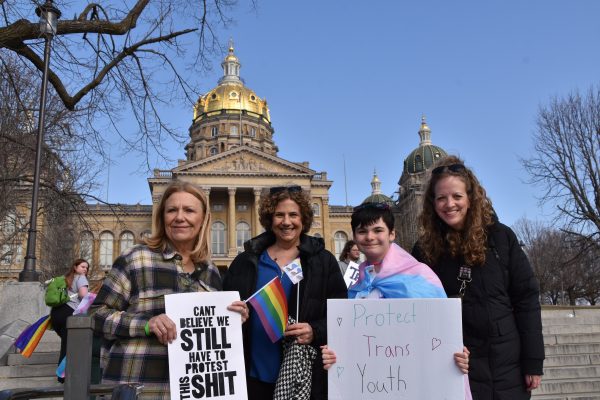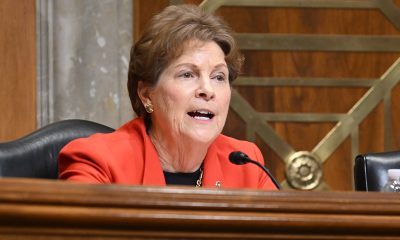National
Iowans stage protest against anti-LGBTQ legislation
Protesters rallied against Republican bills

Frustrated by the onslaught of legislative efforts by Republican lawmakers targeting the state’s LGBTQ community and especially students, a huge protest crowd estimated to be more than 1,000 parents, students, educators, faith leaders, community organizers and elected officials attended the Sunday “Rally to Resist” on the West steps of the Iowa State Capitol.
“Iowans have had enough. We understand that our friends, neighbors and family members are under attack and their rights are being stripped away. And Iowans are unified against anti-LGBTQ bills,” a Progress Iowa spokesperson told the Des Moines Register.
Iowa Senate Democrats welcomed the protestors tweeting: “Today, Iowa students and families showed up to protest all of the anti-LGBTQ bills sponsored by Republican politicians. Senate Democrats were proud to welcome them to the Iowa State Capitol. #ialegis #wesaygay“
Today, Iowa students and families showed up to protest all of the anti-LGBTQ bills sponsored by Republican politicians.
— Iowa Senate Democrats (@IowaSenate) March 5, 2023
Senate Democrats were proud to welcome them to the Iowa State Capitol. #ialegis #wesaygay pic.twitter.com/VSnZ9aOC9g

“No politician has the right to tell us which bathroom to use, deny us medical care, dictate which pronouns to call ourselves, ban books and curriculum, roll back civil rights, deny adoption and foster care, do away with marriage equality, or call queer people obscene,” a Progress Iowa press release stated.
The Des Moines Register additionally reported that the rally comes after hundreds of students across Iowa walked out of class last Wednesday to protest the LGBTQ legislation.
Organizers estimated students at 47 schools across Iowa walked out as Republican lawmakers pushed forward with legislation aimed at tightening school policies and state law regarding gender identity, sexual orientation, gender-affirming care and equity, diversity and inclusion.
In an interview with the Register during the rally, Courtney Reyes, the executive director of One Iowa and One Iowa Action, said that in her 3½ years as executive director she has seen a “constant attack” on the LGBTQ community, specifically targeting transgender people.
“People in that building are making laws about us, and they don’t know about gender healthcare, they don’t know what it means to the families that need that service,” Reyes said. “When you threaten to take that away, you’re putting people’s lives in danger.”
“When folks are having their rights taken away, we need our allies to get uncomfortable,” Reyes told the paper.
Protestors rally at Iowa Capitol in protest of recent LGBTQ legislation:
New York
Two teens shot steps from Stonewall Inn after NYC Pride parade
One of the victims remains in critical condition

On Sunday night, following the annual NYC Pride March, two girls were shot in Sheridan Square, feet away from the historic Stonewall Inn.
According to an NYPD report, the two girls, aged 16 and 17, were shot around 10:15 p.m. as Pride festivities began to wind down. The 16-year-old was struck in the head and, according to police sources, is said to be in critical condition, while the 17-year-old was said to be in stable condition.
The Washington Blade confirmed with the NYPD the details from the police reports and learned no arrests had been made as of noon Monday.
The shooting took place in the Greenwich Village neighborhood of Manhattan, mere feet away from the most famous gay bar in the city — if not the world — the Stonewall Inn. Earlier that day, hundreds of thousands of people marched down Christopher Street to celebrate 55 years of LGBTQ people standing up for their rights.
In June 1969, after police raided the Stonewall Inn, members of the LGBTQ community pushed back, sparking what became known as the Stonewall riots. Over the course of two days, LGBTQ New Yorkers protested the discriminatory policing of queer spaces across the city and mobilized to speak out — and throw bottles if need be — at officers attempting to suppress their existence.
The following year, LGBTQ people returned to the Stonewall Inn and marched through the same streets where queer New Yorkers had been arrested, marking the first “Gay Pride March” in history and declaring that LGBTQ people were not going anywhere.
New York State Assemblywoman Deborah Glick, whose district includes Greenwich Village, took to social media to comment on the shooting.
“After decades of peaceful Pride celebrations — this year gun fire and two people shot near the Stonewall Inn is a reminder that gun violence is everywhere,” the lesbian lawmaker said on X. “Guns are a problem despite the NRA BS.”
New York
Zohran Mamdani participates in NYC Pride parade
Mayoral candidate has detailed LGBTQ rights platform

Zohran Mamdani, the candidate for mayor of New York City who pulled a surprise victory in the primary contest last week, walked in the city’s Pride parade on Sunday.
The Democratic Socialist and New York State Assembly member published photos on social media with New York Attorney General Letitia James, telling followers it was “a joy to march in NYC Pride with the people’s champ” and to “see so many friends on this gorgeous day.”
“Happy Pride NYC,” he wrote, adding a rainbow emoji.
Mamdani’s platform includes a detailed plan for LGBTQ people who “across the United States are facing an increasingly hostile political environment.”
His campaign website explains: “New York City must be a refuge for LGBTQIA+ people, but private institutions in our own city have already started capitulating to Trump’s assault on trans rights.
“Meanwhile, the cost of living crisis confronting working class people across the city hits the LGBTQIA+ community particularly hard, with higher rates of unemployment and homelessness than the rest of the city.”
“The Mamdani administration will protect LGBTQIA+ New Yorkers by expanding and protecting gender-affirming care citywide, making NYC an LGBTQIA+ sanctuary city, and creating the Office of LGBTQIA+ Affairs.”
U.S. Supreme Court
Supreme Court upholds ACA rule that makes PrEP, other preventative care free
Liberal justices joined three conservatives in majority opinion

The U.S. Supreme Court on Friday upheld a portion of the Affordable Care Act requiring private health insurers to cover the cost of preventative care including PrEP, which significantly reduces the risk of transmitting HIV.
Conservative Justice Brett Kavanaugh authored the majority opinion in the case, Kennedy v. Braidwood Management. He was joined by two conservatives, Chief Justice John Roberts and Justice Amy Coney Barrett, along with the three liberal justices, Sonia Sotomayor, Elena Kagan, and Ketanji Brown-Jackson.
The court’s decision rejected the plaintiffs’ challenge to the Affordable Care Act’s reliance on the U.S. Preventative Services Task Force to “unilaterally” determine which types of care and services must be covered by payors without cost-sharing.
An independent all-volunteer panel of nationally recognized experts in prevention and primary care, the 16 task force members are selected by the secretary of the U.S. Department of Health and Human Services to serve four-year terms.
They are responsible for evaluating the efficacy of counseling, screenings for diseases like cancer and diabetes, and preventative medicines — like Truvada for PrEP, drugs to reduce heart disease and strokes, and eye ointment for newborns to prevent infections.
Parties bringing the challenge objected especially to the mandatory coverage of PrEP, with some arguing the drugs would “encourage and facilitate homosexual behavior” against their religious beliefs.
-

 U.S. Supreme Court3 days ago
U.S. Supreme Court3 days agoSupreme Court upholds ACA rule that makes PrEP, other preventative care free
-

 U.S. Supreme Court3 days ago
U.S. Supreme Court3 days agoSupreme Court rules parents must have option to opt children out of LGBTQ-specific lessons
-

 India5 days ago
India5 days agoIndian court rules a transgender woman is a woman
-

 National4 days ago
National4 days agoEvan Wolfson on the 10-year legacy of marriage equality












